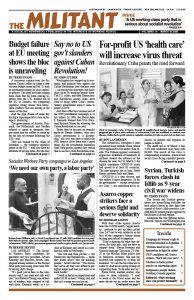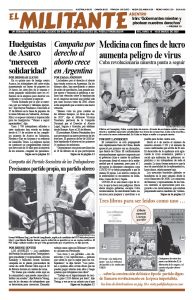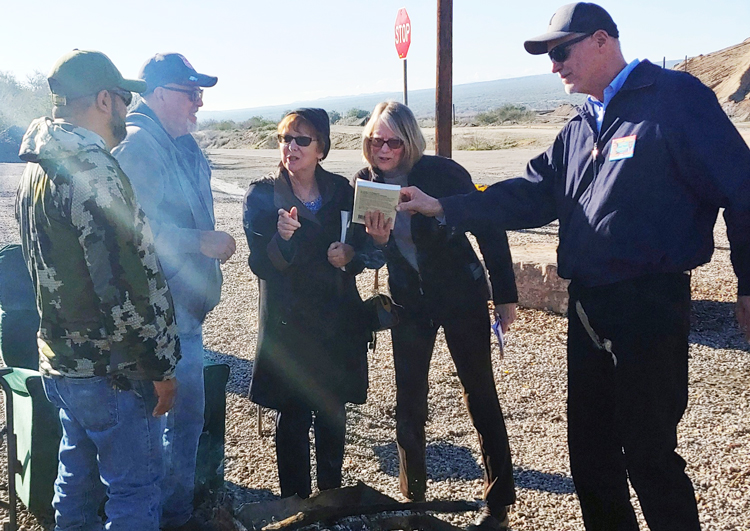HAYDEN, Ariz. — During a solidarity trip Feb. 23-25, Alyson Kennedy, Socialist Workers Party candidate for president, discussed politics and the labor movement today with striking copper miners. She learned more about their fight against Asarco’s union-busting to share with other workers as she tours around the country. Some 1,700 workers have been on strike since Oct. 13.
Kennedy, a Walmart worker and former coal miner, joined picket lines at the Mission Mine in Sahuarita, south of Tucson; at the smelter here; at the nearby Ray Mine north of Kearny; and a strike rally in Phoenix. She also spoke with four Asarco refinery strikers from Amarillo, Texas, who drove 10 hours to join fellow strikers in Arizona at the rally.
“The company absolutely hates that we have a say in things at the mine with a union: ‘No, you should just do what we tell you to do,’” striker and Teamsters Local 104 assistant chief steward Chris Antone told Kennedy at the Mission Mine picket line and dinner Feb. 23. United Steelworkers Local 937 had put news of her visit on their Facebook page.
Many strikers have taken other jobs, mostly lower paid and with conditions worse than at Asarco. Having to work in nonunion conditions has strengthened their resolve to stand up to Asarco.
“At one construction job the owner didn’t provide safety equipment and made us work when it stormed,” Antone said. “I quit after trying to use a fiberglass ladder. The rungs cracked under my feet and my hands got splinters.”
Antone told her he thought “the biggest problem with Bernie Sanders and the other presidential candidates is that they never held a job and don’t know the struggles of American workers.”
“Sanders, like all the rest, defends the interests of the ruling class,” Kennedy said. “That’s why the Socialist Workers Party calls for breaking with both capitalist parties, the Democrats and Republicans, to build a labor party based on the unions, to fight in the interests of all the exploited and oppressed.
“Workers today need to begin by standing up and fighting to defend ourselves like you are doing,” she said.
At the strike rally in Phoenix the next day, Raul Duarte, a Steelworkers Local 886 member and brick mason at the Hayden smelter, invited Kennedy to join his picket the next day. Dennis Richter, SWP Congressional candidate for the 37th District in California, accompanied her. Duarte met the Amarillo strikers at the rally. “I told them if there’s a chance for me to go there, I will!” Duarte said.
When Kennedy and Richter got to the Hayden picket line, Duarte asked them, “Why did they make this state ‘right to work’? It makes things harder. The law weakened the unions. I don’t know if it was the Democrats or Republicans.”
Lessons from Co-Op miners’ battle
Many strikers listened attentively when Kennedy spoke about having been in a hard-fought three-year strike herself from 2003 to 2005 at the Co-Op coal mine in Utah, another right-to-work state. It was one of the most important labor battles in the U.S. at that time.
“The miners, mostly Mexican immigrants, wanted to fight. The company paid us as little as $5 an hour,” she said. “We went to Price to meet the United Mine Workers about getting the union.”
When the company fired them all for joining the union they went out on strike, reached out broadly and won support from Navajo miners, San Francisco longshore workers, community groups and many others across the country.
They tried to convince workers crossing the picket line to join the strike, a challenge Asarco strikers also face. “We had a sign at the Co-Op Mine that said in Spanish: “If you are crossing this line because you are afraid to lose your house or car, keep in mind you are about to lose something bigger — your soul.”
“Everywhere I go, I talk about the need to support your strike,” Kennedy told all Asarco strikers she met.


